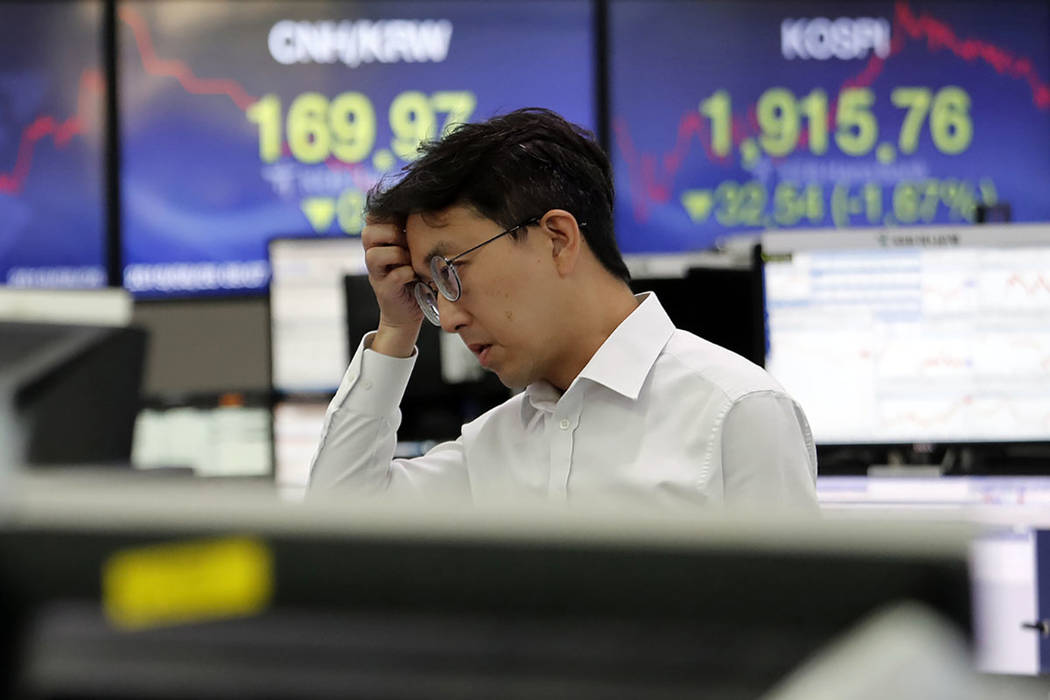Asian shares dropping as US-China trade war renews uncertainty

TOKYO — Asian shares tumbled Monday after the latest escalation in the U.S.-China trade war renewed uncertainties about global economies, as well as questions over what President Donald Trump might say next.
Japan’s benchmark Nikkei 225 started plummeting as soon as trading began and stood at 20,234.87 in the morning session, down 2.3%. Australia’s S&P/ASX 200 slipped 1.5% to 6,427.20. South Korea’s Kospi lost 1.7% to 1,916.14. Hong Kong’s Hang Seng dropped 3.3% to 25,309.37, while the Shanghai Composite was down 1.2% at 2,862.87.
Stephen Innes, managing partner at Valour Markets in Singapore, compared the difficulty of assessing the volatile market situation to reading tea leaves.
“Nobody understands where the president is coming from,” he said, adding that the best thing Trump can do for market stability is to “keep quiet.”
“The problem that we’re faced right now is that we are making a lot of assumptions ahead of the economic realities.”
The market is now dominated by fears of a portending U.S. recession, although the American economy is actually holding up, and much of the U.S. economy is made up of consumption, Innes said. If interest rates come down, he added, consumer spending is likely to go up, working as a buffer for the economy.
“What the market’s really waiting for is for them to drop interest rates,” Innes said. “Right now, we are still sitting on that uncertainty.”
Friday chaos
The Dow Jones Industrial Average plunged more than 600 points Friday after the latest escalation in the trade war between the U.S. and China rattled investors. The broad sell-off sent the S&P 500 to its fourth straight weekly loss.
The tumbling began after Trump responded angrily on Twitter following China’s announcement of new tariffs on $75 billion in U.S. goods. In one of his tweets he “hereby ordered” U.S. companies with operations in China to consider moving them to other countries — including the U.S.
Trump also said he’d respond directly to the tariffs — and after the market closed he delivered, announcing that the U.S. would increase existing tariffs on $250 billion in Chinese goods to 30% from 25%, and that new tariffs on another $300 billion of imports would be 15% instead of 10%. Those announcements are likely to influence stock markets in Asia when trading opens there Monday.
The ongoing trade dispute between Washington and Beijing, and especially its unpredictability, is certain to have damaging effects on Asia. The unpredictability affects the real decisions central banks make on fiscal policy and companies make on their strategies and investments, setting off ripples of uncertainty.
Zhu Huani of Mizuho Bank in Singapore said what he called Trump’s “tariff tantrum” was setting off “the sense that tariffs could continue to rise,” with the “the unpredictability of timing and extent of these trade actions risk accentuating the paralysis of business decisions and big-ticket business spending.”
“No matter which way you cut the cake, it is nearly impossible to construct a bullish, or even neutral scenario for equity markets today,” said Jeffrey Halley, senior market analyst at Oanda.
The tweets from Trump around 11 a.m. last Friday ignited a wave of selling.
The S&P 500 fell 75.84 points, or 2.6%, to 2,847.11. The index is now down 4.5% for the month. It’s still up 13.6% for the year. The Dow lost 623.34 points, or 2.4%, to 25,628.90. The average briefly dropped 745 points. The Dow has had five declines of 2% or more this year, with three of them coming this month. The Nasdaq gave up 239.62 points, or 3%, to 7,751.77. The Russell 2000 index of smaller company stocks skidded 46.52 points, or 3.1%, to 1,459.49.
Trump also said Friday morning that he was “ordering” UPS, Federal Express and Amazon to block any deliveries from China of the powerful opioid drug fentanyl. The stocks of all three companies fell as traders tried to assess the possible implications.
Fed moves
Some analysts think the Federal Reserve will lower interest rates this year.
Federal Reserve Chair Jerome Powell indicated last week that the central bank was prepared to cut interest rates but gave no clear signal on when and by how much, while suggesting that uncertainty over Trump’s trade wars have complicated the central bank’s ability to set interest rate policy.
A quarter-point rate cut reduction in September is considered all but certain. Some think the Fed will cut rates again in December.
The price of benchmark crude fell 71 cents to $53.46 a barrel. It sank $1.18, or 2.1% to settle at $54.17 a barrel Friday, as traders worried that the latest escalation in the trade battle could sap global demand for energy. Brent crude oil, the international standard, fell 63 cents to $58.71 a barrel.
The dollar fell to 105.24 Japanese yen from 106.65 yen Friday. The euro strengthened to $1.1145 from $1.1057.